A Brief Analysis on Chinglish
AnAnalysisofChinglishandCountermeasuresinEn
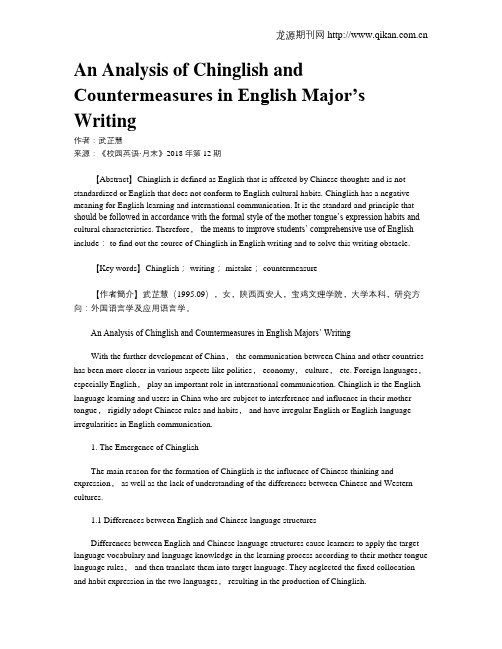
龙源期刊网 An Analysis of Chinglish and Countermeasures in English Major’s Writing作者:武芷慧来源:《校园英语·月末》2018年第12期【Abstract】Chinglish is defined as English that is affected by Chinese thoughts and is not standardized or English that does not conform to English cultural habits. Chinglish has a negative meaning for English learning and international communication. It is the standard and principle that should be followed in accordance with the formal style of the mother tongue’s expression habits and cultural characteristics. Therefore,the means to improve students’ comprehensive use of English include: to find out the source of Chinglish in English writing and to solve this writing obstacle.【Key words】Chinglish; writing; mistake; countermeasure【作者簡介】武芷慧(1995.09),女,陕西西安人,宝鸡文理学院,大学本科,研究方向:外国语言学及应用语言学。
An Analysis of Chinglish and Countermeasures in English Majors’ WritingWith the further development of China, the communication between China and other countries has been more closer in various aspects like politics, economy, culture, etc. Foreign languages,especially English, play an important role in international communication. Chinglish is the English language learning and users in China who are subject to interference and influence in their mother tongue, rigidly adopt Chinese rules and habits, and have irregular English or English language irregularities in English communication.1. The Emergence of ChinglishThe main reason for the formation of Chinglish is the influence of Chinese thinking and expression, as well as the lack of understanding of the differences between Chinese and Western cultures.1.1 Differences between English and Chinese language structuresDifferences between English and Chinese language structures cause learners to apply the target language vocabulary and language knowledge in the learning process according to their mother tongue language rules, and then translate them into target language. They neglected the fixed collocation and habit expression in the two languages, resulting in the production of Chinglish.。
SCI论文翻译如何避免中式英语?

SCI论文翻译如何避免中式英语?在拒稿的SCI论文中,语言表达问题是其中一个拒稿原因。
Wei xin hao:xm4514由于中文语言表达习惯,科研工作者在SCI论文翻译中常常无意识地出现中式英语,导致论文语言不合格。
那么,SCI论文翻译究竟该如何避免中式英语呢?一、中式英语中国式英语指在中文中是正确的表达,但在英文中却是无法理解的。
例如:许多生硬翻译的类型(Good good study,day day up.好好学习,天天向上);汉语直译的类型(“情人眼里出西施”不是“Xishi is in the eye of the beholder”,而是“Beauty is in the eye the beholder”)Chinglish(中国式英语)指的则是由中国特有的东西,是允许存在的。
例如,20世纪30年代逐字翻译的“Long time no see”(很久不见)已经进入英语的标准词组。
在变成英语新词的中式英语中很多是中国独有的词汇或概念。
如儒家思想(Confucianism)、四书(Four Books)、五经(Five Classics)、知识经济(knowledge economy)、和平崛起(peace fulrising)等。
因为海外对中国关注的持续升温,这些具有中国特色的词汇不断出现在海外各种媒体上,成为固定表达。
二、翻译技巧为了让SCI论文顺利发表,科研工作者在翻译SCI论文时,一定要注意避免中式英语。
那么,如何避免呢?可以从以下5点出发。
1、写作时态英语谓语动词时态共有16种,在英文科技论文中用得较为频繁的主要有三种:即一般现在时、一般过去时和将来时。
正确地使用动词时态是科研写作的基本功,我们在撰写英文论文时,如不能正确选用时态,常常会改变文章所要表达的意思,从而影响评审专家与读者的理解。
在科技论文中如何正确使用时态,首先应该把握以下三个基本要点:1)一般现在时:主要用于不受时间限制的客观存在事实的描述,或发生或存在于写论文之时的感觉、状态、关系等的描述或致谢的表述等。
探究生活中的chinglish研究性学习2 文档

探究生活中的chinglish调查报告一、研究背景:“Long time no see!”这句广为流传,大多数人都脱口而出的英语,成为众多英语爱好者或母语为英语的人的口头禅之一。
但是,不觉得这句话带有很强的中文思维吗?其实这句话也属于我们常说那不规范的中式英语的集合中。
国内有许多专家呼吁“消除中式英语,纠正可怕错误”。
但国外一些知名网站如美国社交类网站Facebook却发起“拯救中式英语行动”;普遍的外国人认为中式英语好比美式英语和英式英语,都是两种文化融合的产物,他们自己对中式英语的兴趣是出于“喜欢而非嘲笑”。
中式英语从何而来,是怎样发展成现在的普遍状态呢?它为什么能够影响现在的中国人甚至外国人呢?人们对中式英语的了解和看法是怎样的?是否赞成中式英语继续保留和发展下去呢?因此我们小组决定开展有关中式英语的各方面的研究。
通过对中式英语的研究,了解其定义,成因,例子及人们对中式英语的看法,借此启示我们对中式英语应保持怎样的态度,培养我们对知识的态度和兴趣以及增强对优秀文化的热情二研究对象中式英语”,即Chinglish 。
学习者在写作中往往先用汉语打腹稿,或列出中文提纲,再把汉语一句句机械地转换成英语,带有明显的汉语痕迹,因而不能被以英语为母语者所接受。
在使用英语时,因受汉语思维方式或文化的影响而生搬硬套、拼造出不符合英语表达习惯的,具有中国特征的不规范的或畸形的英语。
这是中国人在学习英语过程中普遍出现的,尽管暂时、却是必然的一种语言现象。
中式英语指带有中文语音、语法、词汇特色的英语,是一种洋泾浜语言。
中式英语在英语被称为“Chinglish”,是汉语及英语的英文混合而成的合体字。
随着英语在中国已经成了一个流行的话题,许多新鲜事也跟着出来了。
据说,2 009年全球最流行的10个词中,就有一个词叫chinglish,也就是中式英语。
最早期的中式英语应该在香港出现。
当时英国强行租借香港岛,在货物起卸区,有不少经常与洋人打交道的人慢慢从洋人口中学得几个简单的英文词语,就用自己的方式把这些刚学会的英语组成字句。
buzzwords
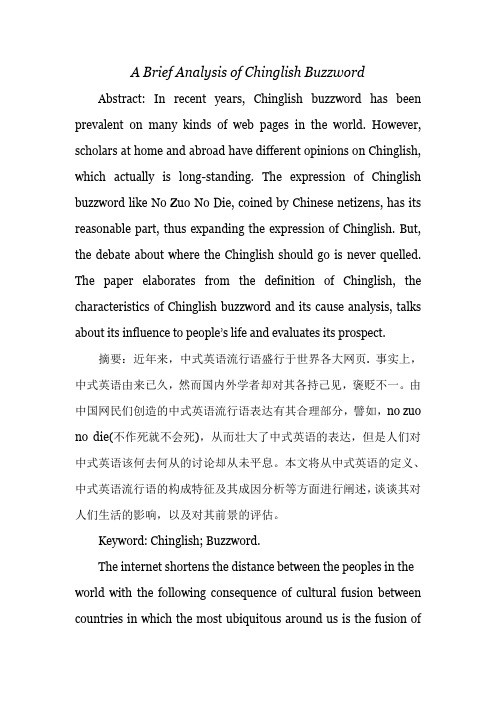
A Brief Analysis of Chinglish BuzzwordAbstract: In recent years, Chinglish buzzword has been prevalent on many kinds of web pages in the world. However, scholars at home and abroad have different opinions on Chinglish, which actually is long-standing. The expression of Chinglish buzzword like No Zuo No Die, coined by Chinese netizens, has its reasonable part, thus expanding the expression of Chinglish. But, the debate about where the Chinglish should go is never quelled. The paper elaborates from the definition of Chinglish, the characteristics of Chinglish buzzword and its cause analysis, talks about its influence to people‟s life and evaluates its prospect.摘要:近年来,中式英语流行语盛行于世界各大网页. 事实上,中式英语由来已久,然而国内外学者却对其各持己见,褒贬不一。
由中国网民们创造的中式英语流行语表达有其合理部分,譬如,no zuo no die(不作死就不会死),从而壮大了中式英语的表达,但是人们对中式英语该何去何从的讨论却从未平息。
An Analysis of Chinglish from Differences between Chinese and English Thinking Models开题报告
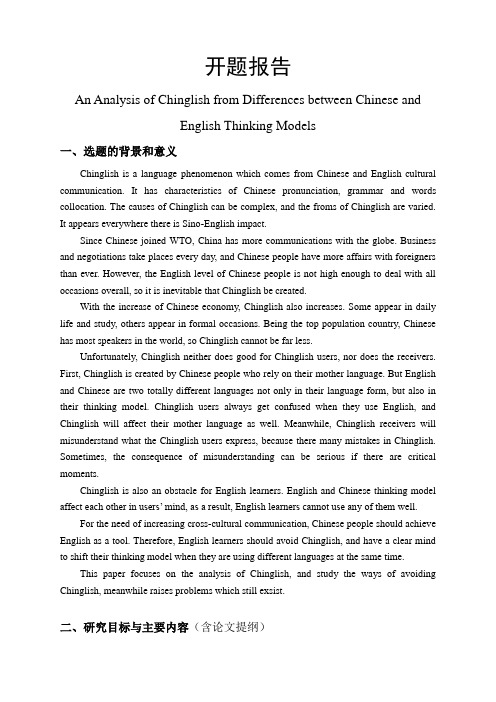
开题报告An Analysis of Chinglish from Differences between Chinese andEnglish Thinking Models一、选题的背景和意义Chinglish is a language phenomenon which comes from Chinese and English cultural communication. It has characteristics of Chinese pronunciation, grammar and words collocation. The causes of Chinglish can be complex, and the froms of Chinglish are varied. It appears everywhere there is Sino-English impact.Since Chinese joined WTO, China has more communications with the globe. Business and negotiations take places every day, and Chinese people have more affairs with foreigners than ever. However, the English level of Chinese people is not high enough to deal with all occasions overall, so it is inevitable that Chinglish be created.With the increase of Chinese economy, Chinglish also increases. Some appear in daily life and study, others appear in formal occasions. Being the top population country, Chinese has most speakers in the world, so Chinglish cannot be far less.Unfortunately, Chinglish neither does good for Chinglish users, nor does the receivers. First, Chinglish is created by Chinese people who rely on their mother language. But English and Chinese are two totally different languages not only in their language form, but also in their thinking model. Chinglish users always get confused when they use English, and Chinglish will affect their mother language as well. Meanwhile, Chinglish receivers will misunderstand what the Chinglish users express, because there many mistakes in Chinglish. Sometimes, the consequence of misunderstanding can be serious if there are critical moments.Chinglish is also an obstacle for English learners. English and Chinese thinking model affect each other in users’ mind, as a result, English learners cannot use any of them well.For the need of increasing cross-cultural communication, Chinese people should achieve English as a tool. Therefore, English learners should avoid Chinglish, and have a clear mind to shift their thinking model when they are using different languages at the same time.This paper focuses on the analysis of Chinglish, and study the ways of avoiding Chinglish, meanwhile raises problems which still exsist.二、研究目标与主要内容(含论文提纲)This thesis mainly discuss the orgin and effects of Chinglish, and to analyse the Chinglish phenomenons. First, discuss the origin to find out the causes of Chinglish that can help the analysis of its characteristics. Second, study its characteristics to get through what are the problems of Chinglish. Third, conclude the phenomenon of Chinglish, and provide ways to avoid it. At last, to study the exsisting peoblems.Now there are countless Chinglish users and few of them have noticed the serious situation. Chinglish is corroding both Chinese and English. Therefore, there should be ways to solve this problem. This thesis will first look into all aspects of Chinglish and Chinglish phenomenons, and provide ways to avoid it.The outline of this thesis\Title: An Analysis of Chinglish From The Chinese and English Cultural Differences1.Introduction2. Features of Chinglish2.1 History of Chinglish2.2 Definition of Chinglish2.3 Granmmar Mistakes of Chinglish2.3.1 Redundance2.3.1.1 Redundant Nouns and Verbs2.3.1.2 Redundant Adjectives and Adverbs2.3.2 Wrong Collocation2.3.3 Wrong Idiomatic Usage3. Comparison of Chinese and English Thinking Models3.1 Chinese Thinking Model3.1.1 Holistic Thinking3.1.2 Indirect Thinking3.1.3 Fuzzy Thinking3.2 English Thinking Model3.2.1 Analytical Thinking3.2.2 Direct Thinking3.2.3 Precise Thinking3.3 Differences between Chinese and English Thinking Models3.3.1 Different Word Order3.3.2 Passive V oice3.3.3 Negation4. Solutions to Chinglish4.1 Understanding English Culture4.2 Enhancing Language Sense and Developing English Thinking Model4.3 Error Analysis5. Conclusion三、拟采取的研究方法、研究手段及技术路线、实验方案等This paper discuss the problems of Chinglish from previous researches. In China, Wang Moxi has a deep understanding of Chinglish, he first began the research of Chinese and English thinking model, which can help finding the causes of Chinglish. Though the study of Chinglish started late, researchers have different opinions towards Chinglish and they have work out some critical issues.Besides, the characteristics are clear through the study of previous researches, but the situation has changed. This paper will mainly focus on the new Chinglish phenomenon and new problems. This paper will study Chinglish from other aspects as an addition. First, to dicuss Chinese English learners’ le arning approach and English learing situation in China recent years. Second, find out reasons for Chinglish emerging through English learning. At last, conclude the shortage of education system and provide ways to avoid Chinglish.The methods for analysing recent situation is collecting information in school teaching and learning. Chinglish always come from English learning, and through surveys, it can get the latest information of study.Another way to approach the need of research is Internet. Internet provides data of Chinglish and related elements, and also shows others’ point of view.四、参考文献[1]Cheng Zhenqiu. On Problems of Translation—A series of talks given at the institute of Journalism[M]. Beijing: Foreign Language Teaching and Research Press, 1981.[2]Pinkham Joan. The Translator’s Guide to Chinglish[M]. Beijing: Foreign Language Teaching and Research Press, 1998.[3]Nida A. Eugene & Charles R. Taber. The Theory and Practice of Translation[M]. Leiden: E. J. Brill. 1969.[4]金惠康.跨文化交际翻译[M].北京: 中国对外翻译出版公司,2003.[5]王振亚.语言与文化[M].北京:高等教育出版社,1999.[6]阎苹.中西文化面面观[M]. 沈阳:辽宁大学出版社, 2010.[7]郭富强.意合形合的英汉对比研究[M]. 青岛:中国海洋大学出版社,2007.[8]卢加伟,张晓莉.语用迁移与二语水平的关系研究[M]. 北京:科学出版社,2009.[9]王培英.跨文化交流[M].北京:旅游教育出版社,2007.[10]Vivian Cook. Effects of the Second Language on the First.[J] Multilingual Matters Ltd,2009.[11]章国军. 透视中式英语[J].韶关学院院报,2005.[12]王墨希.中国学生英语语篇思维模式调查[J]. 外语教学与研究,1993.[13]郭剑晶.中式英语成因探究[J]. 湖南科技学院院报, 2007.[14]郑博,陈丹丹.从翻译角度浅析中式英语产生的原因及对策[D].武汉:中南财经政法大学,2009.[15]吴克炎. 英汉习语的文化误读探源[D].漳州:漳州师范学院,2006.五、研究的整体方案与工作进度安排(内容、步骤、时间)六、研究的主要特点及创新点This paper has collected previous study on Chinglish, and combined with situations appeared recent years. With the help of previous study, this thesis can study in a new angle ofview and look into new problems. Though this way, the trend of Chinglish can be offered. Meanwhile, the study of this trend can find problems and key to these problems.There are some extra problems which causes Chinglish. This paper dicuss the Chinese educational situation and has find out problems. Every problem comes for a reason, so does Chinglish. The first Chinglish comes because of cultural communications, but nowadays it is not so absolute. Many Chinglish comes from English learners, so there must be some problems in teaching and learning methods.Besides, Chinglish not only comes from objectives factors, but also comes from the attitude towards it. Chinese people have not noticed the seriousness of Chinglish, and most of them have ignored. Chinglish has a big population, it is difficult to be controlled. So the change of attitude is important.Combine with English view and Chinese view, this paper gives an overall conclusion of Chinglish. After analysis of Chinglish problems, the ways to help Chinese people learning English also come out.。
浅析大学生英语四六级翻译中的chinglish现象2 - 副本
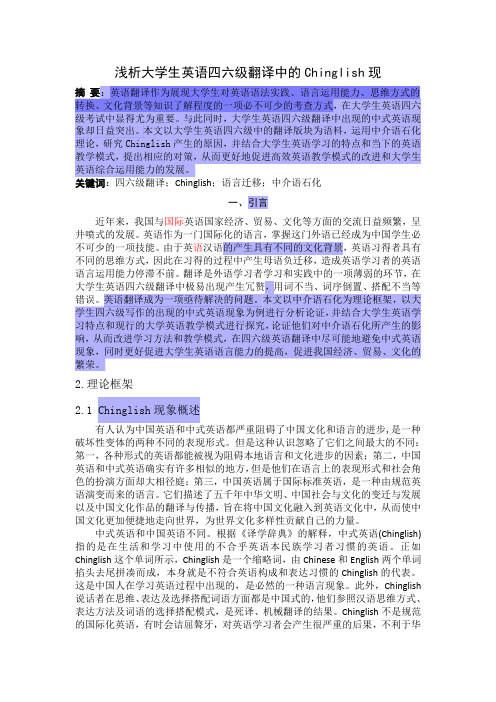
浅析大学生英语四六级翻译中的Chinglish现摘要:英语翻译作为展现大学生对英语语法实践、语言运用能力、思维方式的转换、文化背景等知识了解程度的一项必不可少的考查方式,在大学生英语四六级考试中显得尤为重要。
与此同时,大学生英语四六级翻译中出现的中式英语现象却日益突出。
本文以大学生英语四六级中的翻译版块为语料,运用中介语石化理论,研究Chinglish产生的原因,并结合大学生英语学习的特点和当下的英语教学模式,提出相应的对策,从而更好地促进高效英语教学模式的改进和大学生英语综合运用能力的发展。
关键词:四六级翻译;Chinglish;语言迁移;中介语石化一、引言近年来,我国与国际英语国家经济、贸易、文化等方面的交流日益频繁,呈井喷式的发展。
英语作为一门国际化的语言,掌握这门外语已经成为中国学生必不可少的一项技能。
由于英语汉语的产生具有不同的文化背景,英语习得者具有不同的思维方式,因此在习得的过程中产生母语负迁移,造成英语学习者的英语语言运用能力停滞不前。
翻译是外语学习者学习和实践中的一项薄弱的环节,在大学生英语四六级翻译中极易出现产生冗赘,用词不当、词序倒置、搭配不当等错误。
英语翻译成为一项亟待解决的问题。
本文以中介语石化为理论框架,以大学生四六级写作的出现的中式英语现象为例进行分析论证,并结合大学生英语学习特点和现行的大学英语教学模式进行探究,论证他们对中介语石化所产生的影响,从而改进学习方法和教学模式,在四六级英语翻译中尽可能地避免中式英语现象,同时更好促进大学生英语语言能力的提高,促进我国经济、贸易、文化的繁荣。
2.理论框架2.1Chinglish现象概述有人认为中国英语和中式英语都严重阻碍了中国文化和语言的进步,是一种破坏性变体的两种不同的表现形式。
但是这种认识忽略了它们之间最大的不同:第一,各种形式的英语都能被视为阻碍本地语言和文化进步的因素;第二,中国英语和中式英语确实有许多相似的地方,但是他们在语言上的表现形式和社会角色的扮演方面却大相径庭;第三,中国英语属于国际标准英语,是一种由规范英语演变而来的语言。
英语写作中常见中式英语分析

Analysis on Common Chinglish in English CompositionAcknowledgementsFirst of all, I would like to show my deepest gratitude to my supervisor, a respectable, responsible and resourceful scholar, who has provided me with valuable guidance in every stage of the writing of this thesis. Without his/her enlightening instruction, impressive kindness and patience, I could not have completed my thesis. The keen and vigorous academic observation enlightens me not only in this thesis but also in my future study. I shall also extend my thanks to my parents for all their kindness and help. I would also like to thank all my teachers who have helped me to develop the fundamental and essential academic competence. My sincere appreciation also goes to the teachers and students from my university, who participate in this study with great cooperation. At las t, I’d like to than k all my friends, especially my lovely roommates, for their encouragement and support.AbstractAs the society is more and more progressive and the international association is gradually frequent, the modern society has a higher requirement on the English writing ability of university students. The writing ability can re flect a person’s English level and is required by the teaching program of our country. Nevertheless, it is obvious that much Chinglish is found in English writing of a great many of students. Chinglish is a significant factor which influences the English level of students, and is also an expression mode which is disturbed by the mother tongue, does not meet English grammar and does not meet English usage during the learning course of English learners in China. The Chinese English can be reflected from speaking, writing and translation. However, writing is a formal written form, so that the Chinese English is commonest in English writing.The thesis is divided into five chapters. The first part is a general introduction of the current condition of English writing of Chinese students, and then Chinese English in the English writing is briefly introduced. The types of Chinese English in English writing are analyzed in the second chapter and comprise mechanical application of Chinese structures, inaccuracy in wording, grammatical mistakes and the like. The reasons resulting in Chinese English in the English writing are analyzed in the third chapter. The reasons are the influence from the mother tongue, the influence from the Chinese thinking mode, and the like. Strategies for reducing Chinese English in English writing are provided in the fourth chapter. If we want to reduce Chinese English, we should get rid of the limitation of the mother tongue, convert the Chinese thinking mode into the English one. The last chapter is the conclusion of the thesis. Key words: English writing; Chinglish; analysis随着我国社会越来越进步以及与国际的交往日趋频繁,现代社会对于大学生英语写作的能力有了更高的要求,写作能力能体现一个人的英语水平也是我国教学大纲的要求。
Chinglish vs China English 中式英语和中国式英语.ppt
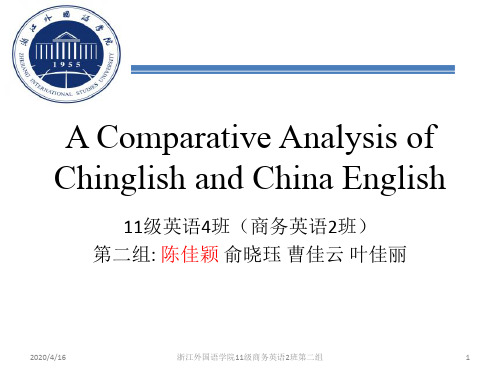
know is know noknow is noknow (知之为知之,不知为不知) you have two down son (你有两下子)
2020/4/16
浙江外国语学院11级商务英语2班第二组
7
The features of Chinglish
• 3.Discourse features Certain unique discourse features exist in written Chinese English, such as "inductive" structure and a preference for a "problem-solution" pattern.The sentences of Chinese English are violating the grammar,and even without any grammars.The features of discourse in Chinese Pidgin English are using English words but Chinese grammars.
grammar.
Chinglish, is that misshapen, hybrid language that is neither English nor Chinese but that might be described as “English with Chinese characteristics”.
2020/4/16
浙江外国语学院11级商务英语2班第二组
8
Examples in daily life
Chinglish: slip carefully English: Please mind your step
07届本科毕业论文备选题(英语专业)

07届本科毕业论文备选题(英语专业)英汉翻译方向On Foreignization and Domestication of Cultural Factors in Translation(浅谈翻译中文化因素的异化和归化)On Treatment of Cultural Factors in Translation (翻译中文化差异的处理方法)On English Translation of Public Signs in Chinese (汉英公示语的翻译)On Translation of English Names of Commendation (英语商品名称的翻译)The relationship between Cultural Difference and Translation Skill 中英文化差异与翻译An Approach to the Translation of Poetic Image诗歌翻译的意象问题探讨A Study of the Chinese Version of Titles of English Films英语电影片名汉译研究A Study of the Chinese Version of Titles of English Novels英语小说题目的汉译问题A Comparative Study of the English Version of the Poem “ Untitled “ by Li Shangyin 李商隐的诗〈无题〉的英译比较研究Foreignization and Translation of IdiomsOn Culture Translation under ForeignizationOn Faithfulness in TranslationOn Fidelity and Expressiveness in TranslationInterpreting and Interpreting SkillsOn Literal Translation and Free TranslationThe Comparison and Translation of Chinese and English IdiomsEquivalence and its Application in TranslationCultural Equivalence in TranslationLearning a Foreign Language Through TranslationArts in Verse TranslationA Comparative Study of Two English Version of Hong Lou MengOn Translating the Passive VoiceOn the Translation of English Long SentencesThe Social and Cultural Factors in Translation PracticeThe Application of Functional Equivalence in English and Chinese Cross-cultural Trans Exploring English-Chinese Audiovisual TranslationOn Chinese Translation of Journalistic EnglishOn the Criteria of InterpretationOn the Unit of TranslationThe Cultural Differences and Arts of Translation in Advertising LanguageOn Transformation between Parts of Speech in E-C TranslationExploring Substitution and Ellipsis in TranslationOn English Proverbs TranslationOn the Criteria of TranslationThe Analysis of Translation StyleCultural Differences and Translation StrategiesTranslation and Foreign Language YeachingChinglish in C-E YranslationA Contrastive Study of English and Chinese Allusions and their Translation English Neologisms in Newspaper and their TranslationOn Translation of Humor in Pride and PrejudiceOn Features of Journalistic English and its TranslationCultural Discrepancies and their Influences on TranslationEnglish and Chinese Translation Song lyricsTranslation of Address Term between English and ChineseOn the Importance of Context in TranslationOn the Translation of English Pun into ChineseThe Role of Dictionary in TranslationThought Pattern and its Influence on TranslationLexical Characteristics of Legal English and Legal Lexicon Translation Features of Foreign Trade English and its Translation ModelOn Euphemism TranslationTranslation of Metaphor from English into ChineseFeatures of Tourism English and its Translation翻译中的文化因素影视字幕翻译的原则影响长句翻译的因素例析英译汉中形象语言的处理生活中广告英语的翻译特色对翻译原则“以信为本,求真求美”的思考翻译中的中国英语与中国式英语南昌旅游景点中英翻译错误及纠错对策背景知识在口、笔译中所扮演的角色分析商务英语翻译的不对等性英美文学The Gift of Magi and ConsumensmA Brief Comment on An American TragedyAn Analysis of the Source of Dichson's Death PoemsOn The Call of the WorldLove Tragedy and War—An Analysis of A Farewell to ArmsSister Carrie and Jennie GerhardtThe Evil of Mankind Portayed in Moby DickOn Henry Heming in The Red Badge of CourageEmily Dickingson and her PoemsAnalysis of A Rose of EmilyThe Aesthetic Interpretation of Ezra Pound's PoetrySymbolism in The Great Gatsbyan Analysis of the theme of adventures of Huckleberry FinnOn the symbolism of The Old Men and the SeaSome English Learner’ image of America(survey and study)Influence of the Bible on English LiteratureDeviation and Foregrounding in … (using literar y works for a case study)The Language of Shakespeare’s Sonnets, or of any particular literary worksCultural Shocks in the English Language TextbooksDeep Love And Deep Hate—A Brief Analysis On Wuthering HeightsPsychological Descriptions In Hemingway’s The Snows Of KilimajaroOn Ernest Hemingway And His Novel The Sun Also RisesDifference Between China And The West Reflected In Social Manners鸟的赞歌--------评英国浪漫派诗歌《呼啸山庄》的悲剧分析海明威英汉形象和冰山风格《名利场》的现实意义苔丝的形象分析哈姆雷特的犹豫再探讨爱伦坡小说的艺术创作成就爱伦坡小说人物塑造O Neill剧作对美国戏剧的影响华兹华斯的语言风格华兹华斯的自然观诗人哈代简述哈代的悲剧性叙事艺术On Hardy's tragedy narrative art奥斯丁与勃朗特写作风格异同The comparison between Austen and Bronte in writing style 杰克·伦敦(或某作家)《》(某作品)评述On Farewell to Arms of Hemingway浅析《失乐园》中撒旦的形象塑造《还乡》的悲剧艺术特色蓓基形象再解读蘩漪与伯莎梅森的比较研究爱玛形象的魅力海明威研究——浅析海明威笔下的女硬汉子《苔丝》的悲剧性与现代性 Tragedy and Modernity in Tess of D’Urbervilles华兹华斯诗歌的和谐观 On the View of Harmony in Word sworth’s Poetry海明威小说的悲剧意识从《老人与海》看海明威的创作特点《红色英勇勋章》的叙述技巧分析论《白鲸》的象征含义论吴尔夫的《一间自己的房间》中的女权主义论简.奥斯汀对《爱玛》主人公的塑造《红字》中的象征哈姆雷特的人物特征及悲剧根源华兹华斯《孤独的割麦女》赏析杰克·伦敦的个人奋斗莎士比亚的悲剧人物《名利场》人物与艺术特色之分析简析英国浪漫派诗人:1800年左右安东尼奥与夏洛克的对抗肖伯纳的戏剧评论简论十九世纪英国女性生活The Beauty in Sense, in Sound and in Form关于德伯维尔家族的叙述在《苔丝》中的重要作用德莱塞的自然主义论海明威的死亡意识The Negative Influence of Society on the Oliver TwistMrs. Browning’s Sonnets from the PortugueseLove Stories in William Cather’s “O Pioneers”The Literature Characteristics in A Tale of Two CitiesOn the Symbolism of wrence’s “The Rainbow”Simple Analysis on Milton and Paradise LostOn the Author and the Major Characters of The PearlThe Analysis of Santiago’s CharacterRobinson Crusoe and the Colonial EmpireA Farewell to Arms—A Clear MirrorOn the Humanism in "A Tale of Two Cities"The Modernist Features in "Wuthering Heights"A Feminist Study of "Heart of Darkness"Naturalism as Reflected in "The Call of the Wild"论《天路历程》的象征和社会意义论《名利场》的社会意义浪漫的现实——丁尼生作品浅析《蝇王》中的象征迪金森的自然诗麦琪悲剧的成因——《弗洛斯河上的磨坊》解读从存在主义视角解读《永别了武器》《永别了武器》中主人公亨利形象分析《蝇王》的主题分析《蝇王》的象征意义英语教学法On Sino—Western Cultural Differences and the Structure of Chinese College Students' 中西文化差异与中国大学生中式英语结构The Application of Cooperative Learning Theory in Senior High School English Reading 高中生英语阅读教学中合作学习理论的运用Interaction in Oral English Teaching 英语口语教学中的互动On Developing English Reading Skills 论英语阅读技能的培养The Strategies of Topic Controlling in Spoken English 英文口语中的语题控制策略Communicative Competence and Focused Task-based Teaching ApproachError Analysis and English TeachingOn Developing English Reading SkillsInteraction in Oral English TeachingRole-play in English TeachingCultural Teaching in English in Middle SchoolUsing Questions in English ReadingResearch on the Improvement of Middle School Students’ Communicative CompetenceOn Bilingual Teaching in Primary SchoolHow to Design Questions in the Classroom TeachingNew Concepts of Modern English TeachingHow to Arouse Students’ Potentialities in Learning English by Using Non-intelligence Autonomous Language Learning in CALL EnvironmentsOn Attitude and Motivation in Second Language LearningMaking Use of Resources on the Internet to Assist English LearningTask-based Language Teaching Methodology and its Application in ReadingUsing Task-based Method and Internet Resources to Improve Teaching of Classroom Readi The Study of Learner’s Motivation and its In fluence upon Learners and their Learning On Communicative Competence, Exploring the Learning Process in China’s Context Interaction and English Language TeachingTeacher’s Roles and their Impact upon Learner’s Learning ProcessThe Comparison or Analysis of Different ELT Methods and its Application in China’s L The Student’s Learning Autonomy and Language TeachingTeaching the Different Skills Based on the Interactive Approaches.The Relationship between Affective State and Language Learning.Errors and Language Learning.Teacher’s Talk and Students’ LearningMy Perspectives of Senior/Junior English for ChinaCognitivism and English Teaching of Listening and SpeakingA Survey of Students’ Motivation of Learning EnglishExtracurricular Activities and English TeachingA Study on Cooperative Learning in Classroom TeachingCommunicative Approach and Grammar TeachingNetworked Multimedia and Senior/Junior English TeachingIs Multimedia Effective for Language Learning/Teaching?Improving English Reading through Online NewspapersReflections on CALL/CAINetwork-based English Teaching of Reading/Writing/Listening: What Advantages? Applying Task-based Teaching Principles to Organize Oral Classroom Activities Interactive Theory and the Teaching of Listening ComprehensionEffective Ways to Improve Efficiency of Vocabulary LearningImprove Students' Oral Proficiency by UsingCommunicative Language Teaching MethodTeaching English by Student-centered ApproachHow to Combine Traditional English Teaching Methods with Communicative Language Teach Importance and Feasibility of Improving Students' Communicative CompetenceMake the Best of Language Learning Strategies to Improve English Learning Efficiency How to Improve Students' Learning Style in Classroom TeachingThe Importance of Understanding Mild Tones in Studying the English LanguageThe Role of Cultural Background Knowledge in Studying the English LanguageOn English Vocabulary AcquisitionEnglish and Chinese Comparison and TranslationDifferences between American and British EnglishA Cognitive Approach of English OnomatopoeiasA Brief Analysis of English MoviesEnglish Ambiguity and Its FunctionThe Pragmatic Analysis of the Motivations for EuphemismInfluence of Science and Technology on English VocabularyA Study of Student-Centered English Vocabulary TeachingFactors Influencing English Learning and Possible SolutionsComputer-assisted English ReadingApplication of Non-verbal Communication in English TeachingPsychology in English TeachingHow to Develop Students’ Abilities to Listen and Speak English EffectivelyHow to Make Use of Mother Tongue in English TeachingPrinciples of English Learning and TeachingStrategies on Intercultural Communication Training in English TeachingReading Efficiently: An English Classroom Model Focusing on Students’ Reading Abilit Factors Affecting English Listening and its Appropriate MeasuresIntensifying Cultural Awareness in Middle School English Teaching—With A Sample Teac Apply Communicative Approach to Pleasant Teaching—Analysis Of My Sample Teaching Exp The Strategic Difference between Effective Listeners and Ineffective ListenersOn Error-Correction Strategy in Oral English ClassroomOn the Use of Interactive Approach in Writing ClassroomOn the Reciprocal Method of Teaching English ReadingOn Developing English SkillsCollaborative Learning in Writing ClassMotivation in English LearningTask-based Teaching in Writing ClassThe Brain-storming in English WritingIncreasing Cultural Awareness in English WritingThe Importance of Free WritingThe Application of Multimedia Technology in College English TeachingThe Connection between College English Teaching and CET-BAND4How to Improve the Students' Listening Ability Effectively in English TeachingTask-based Method of English Teaching in Middle School英语单词科学记忆如何提高英语阅读速度与质量How to improve English reading speed and quality如何在阅读教学中培养学生的跨文化意识如何在英语阅读教学中体现师生的互动略论课外阅读与英语写作的关系外语工作者如何为江西在中部地区崛起做出贡献略论英语听力能力的培养如何培养大学非英语专业学生的四项基本技能如何提高大学生的英语写作水平大学英语专业学生词汇量与阅读能力相关性研究课堂里的艺术--口语教学研究增强课堂活力-英语听力课的教学探索和实践提高中学英语课堂教学质量的途径快乐活动性原则及其在儿童英语教学中的应用科技英语口译人才培训研究口语教学中的模拟训练方法精读教学法在外语教学中的利与弊教师行动研究在中学英语教学中的应用中国初中英语教师素质探究论多媒体辅助大学英语课堂教学的利与弊浅谈新课标背景下中学英语课堂活动教学论“互动”教学法提高英语学习兴趣的有效途径高校专业英语阅读教学模式初探优秀语言教师素质--专业学生的观念调查学生评教的意义和问题专业学生英语自主学习模式研究建构支持专业英语学习的校园环境专业英语课程设置合理性问题探讨课堂交互性调查--中方和外方教师课堂比较外教在提升专业英语水平的角色探讨专四对英语学习的影响(后效作用)专八对英语学习的影响(后效作用)专业英语学习中管理策略的使用如何利用多媒体辅助教学手段促进中学外语教学?英语教学中语言与文化的关系几种外语教学方法的比较问题、思考、改进——使每个学生学好英语英语教学中的文化意识英语教学中如何实施被动学习向主动学习的转化英语阅读教学的发展趋势与探索英语课堂教学中的双向交流英语教学几种课型的安排教学评价之我见改革英语教学方法注重培养学生能力浅谈“pairwork”在课堂教学中的运用英语教学中的“互动”教学模式多媒体英语教学与学生自主学习能力的培养英语教学活动中作业布置法的实践与研究从英语写长法学习英语写作江西农村中学外语教学现状调查江西农村小学外语教学现状调查论多媒体教学条件下的师生互动论外语教学模式与大学生学习动机的相融性大学英语常用段落展开手法双语教学实践与研究英语专业泛读教学的思考与实践英语专业“阅读”课教学改革英语专业基础阅读课与短期强化培训阅读课比较英语口语学习策略英语听力学习中的干扰因素分析英文电影与英语听说教学任务型教学方法在中学外语教学中的应用研究非言语交际与外语教学焦虑对听力理解的影响论学习风格和英语成绩的关系互联网在外语教学中的作用课堂提问的方式和技巧中英恭维语比较英语语言学可理解输出假设的中国现实性The Local Reality of the Comprehensible Output Hypothesis可理解输入假设的心理现实性The Psychological Reality of the Comprehensible Input HypothesisAn Analysis of the Access Effect Advantages of the Prefabricated Chunks预制语块提取效应优势分析The Presentation of the Second Language’s Mental Lexicons of Chinese Middle School S 中国中学生二语心理词汇的表征Ways of Child Language Acquisition儿童语言习得方法The Change of English Word Meaning: Factors and Types英语词义改变:因素与类型The Linguistic Characteristics of Advertising EnglishOn Linguistic Features in O Henry's WorksOn the Formation and Use of Parody in English and Chinese英语语音学浅析从翻译视角看中西方思维差异被动意义表达的英汉对比研究英汉复合名词对比研究英汉否定表达比较研究英汉语序比较与翻译问题研究语篇(话语)分析功能语言学与阅读教学翻译理论与实践词汇教学方法与技巧语言问题研究语用学与教学英汉句法对比研究认知语法与句法教学语用失物分析再谈认知隐喻交际修辞的语用分析探究语篇信息度的认知分析英语语音学的理论与实践语言与文化The Analysis on the Differences of Interpersonal Relationship between Eastern and Wes 东西方人际关系要素差异探析On Values of Chinese from Perspective of Lexicon从词汇角度读中国人的价值观Research on Sino-Western Differences of Cooperative Principles合作原则的中西方差异初探The Comparison of Euphemism in Wording of Sino-Western Letters中西书信用语的委婉语比较How to avoid ambiguity in different culture如何避免由文化差异造成的歧义On the Influence of Network Vocabulary on Chinese Language英语网络词汇对汉语的影响The Cultural Connotation of English Etymology and the Teaching of English Vocabulary 英语词源的文化内涵与词汇教学An Analysis of the Political Prejudice in VOA 《美国之音》的语汇与政治偏见分析A Comparison Between News Report of BBC and VOA BBC 与VOA新闻报道之比较English idioms—A Mirror Reflecting British CultureAmerican culture Reflected in the Use of Words of American EnglishTranslation of Brand Names and their Cultural AssociationsOn Cultural Differences of Body Language between English and ChineseA Comparative Study on Sexism in both English and ChineseEuphemism—Their Construction and ApplicationCultural Comparison in IdiomsThe Cultural Conflict in the Cross-Cultural CommunicationA Talk of Cultural Difference between China and the WestOn Language and Culture in TranslationFamily Education Differences between China and Western CountriesThe Effect of Context on the Meaning of WordsA View on the Differences between Chinese and English Cultures with Regard to TaboosA View on the Differences between Chinese and English Cultures with Regard to Etiquet A View on the Similarities and Differences between Chinese and English Cultures in Te Proverbs and CultureExotic Cultures Influence on English VocabularyThe Differences Between Chinese and Western Cultures and English Education The Impact of Economic Globalization on World CultureThe Cultural Effect Of Civilized English On English Writing从现代汉语中的英语外来词看中国文化对西方文化的吸收与处理中国学生英语习得中的母语迁移现象论影响跨文化沟通的主要因素校园交际中的语码选择唐诗英译中文化意象保留英语教学中汉文化的参与和渗透母语和第二语言阅读的文化差异与认知体系英语写作中汉语干扰因素分析中英文化交际差异对比英语词汇与变化类比在现代中英词汇中的应用拟声理据的应用词的理据与文化历史的关系小说《喜福会》中的文化碰撞广告语篇翻译中的跨文化交际汉语的负迁移与英语学习论中西文化的差异对中西餐饮业的影响英汉词汇的社会文化内涵漫谈美语口语中的俚语现象透析汉英颜色词背后的文化英汉习语文化差异探源浅析英语委婉语。
关于chinglish的英语作文
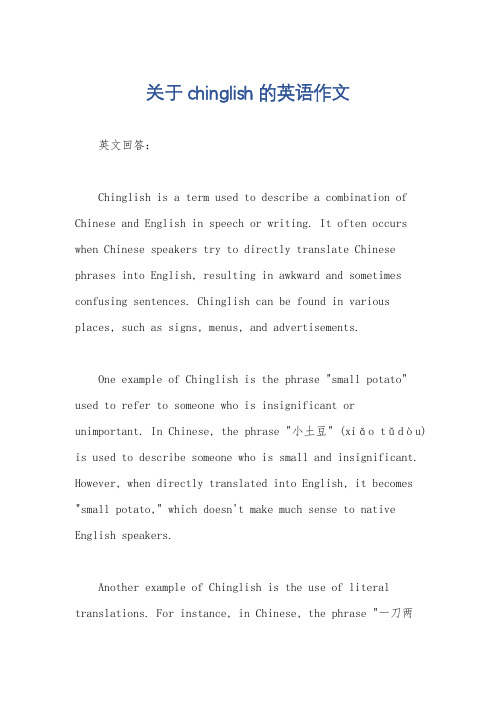
关于chinglish的英语作文英文回答:Chinglish is a term used to describe a combination of Chinese and English in speech or writing. It often occurs when Chinese speakers try to directly translate Chinese phrases into English, resulting in awkward and sometimes confusing sentences. Chinglish can be found in various places, such as signs, menus, and advertisements.One example of Chinglish is the phrase "small potato" used to refer to someone who is insignificant or unimportant. In Chinese, the phrase "小土豆" (xiǎo tǔdòu) is used to describe someone who is small and insignificant. However, when directly translated into English, it becomes "small potato," which doesn't make much sense to native English speakers.Another example of Chinglish is the use of literal translations. For instance, in Chinese, the phrase "一刀两断" (yī dāo liǎng duàn) means to cut ties completely. However, when directly translated into English, it becomes "one knife two breaks," which is not a phrase commonly used in English.Chinglish can also lead to misunderstandings and confusion. For example, a sign in a park in China may say "Please do not step on the grass, violators will be prosecuted." The word "violators" is not commonly used in English, and the phrase "prosecuted" implies a legal consequence, which is not appropriate for stepping on grass.A more appropriate translation would be "Please do not step on the grass, offenders will be fined."Chinglish can be amusing at times, but it can also be frustrating for both native English speakers and Chinese speakers. It can create communication barriers and hinder effective understanding. Therefore, it is important forboth Chinese and English speakers to be aware of the differences in language and culture and strive for accurate translations.中文回答:Chinglish是一个用来描述中英混合语言的术语,它通常发生在中国人试图直接将中文短语翻译成英文时,导致句子尴尬且有时令人困惑。
An Analysis of the Popularity of Chinglish in China

An Analysis of the Popularity of Chinglish in China冉波2班09044235Abstract: Chinglish is what occurs when the Chinese language and English language crash into one another. In China, we can hear the Chinglish that spoken by the native Chinese who attempt to translate directly the Chinese into English in Chinese grammar, sentence structure and so on. However, the Chinglish is very popularity in our daily life. As we know, English is looked as a tool for communication, Chinglish too. Though Chinglish has his own characters, it sometimes will make some troubles in life. Therefore, this paper focused on analyzing the cause of the popularity in China and try to help the Chinese to overcome the Chinglish that occurs in their life may make some unnecessary misunderstandings.Key words: Chinglish, cultural, thinking modes,I IntroductionChinglish has become a universal phenomenon among the English learners in China. Chinese English is a variety of English, which perform the Chinese characteristic of social and cultural phenomenon. Therefore, Chinglish, as a product of combination of Chinese and English, is different from the standard English. The Chinglish also can perfume a communication tool. However, the abusing of Chinglish will form a block to Chinese and western cultural communication. In order to solve this problem, the Chinglish should be eliminated and the local English spoken by Chinese should be popularization.II the present situation of Chinglish2.1 The cause of ChinglishBased on my own experience and research, I found the Chinglish is a seriousproblem in our oral English, and the cause of Chinglish can be classified into three categories: modes of thinking, cultural background and the native language.2.1.1 modes of thinkingWestern thinking pays more attention to the result while Chinese thinking prefers the process. For instance, English major student who translate”牌子上写着严禁入内”into ” the sign writes NO ENTRY”instead of “ the sign reads NO ENTRY”. Such way of thinking is very common. More example, “great disappointment” translate into Chinese “令失望”. In the process of translating, the noun transferred into verb. Western also pays more attention to the individuals instead of the group. In English, the characteristic of” the individual first, group second” is very obvious. Take the order of the peoples name as one example. In foreign country, the people who always put the given name in front of family name. In turn, when we call sb’ name, his family name goes first. However, the English students try to translate Chinese name into English, they should follow the western principles. Just take my name as an example, the foreigner will call me “Bo ran”.2.1.2 Cultural background differencesDifferent countries have different cultures and ways of living, which affects their ways of expressing themselves. Therefore, the Chinese and the western have different understandings on expressions and vocabulary. For example, Chinese people prefer the number 8 and 9. number 4 is not popular. In the west, we cannot find no.13 among their daily life. More an interesting example is that a Chinese sold cigarette, which named goat, in England. If he knows the England cultural, he would not make such a lower mistake. Actually, the goat in England has another meaning that is women-killer, it is a bad word.From my point view, I believe the foreigners are outgoing and assertiveness. Maybe they areinfluenced by their special environment. In contrary, the Chinese are looked as conservative and modesty. It is well known that china is very conservative before putting out the open policy in 1978. as a result, the influence of communication makes Chinese people modesty with their expressions. And we rarely directly accept people’s praise or gratitude. Just like in western countries, we can often hear the word “please”. In China, the first sentence we said is “你吃饭了吗” instead of “hello, how are you”. While the foreigners will think we Chinese are impolite to their secret. From what I have mentioned is caused by the cultural misunderstandings.2.1.3The native languageWhen we learn English, at most cases, we use English at the first thought of Chinese. And then translate it directly into English to express what we want to say. Just take “personally thinking” and “I think”as example, the two phrases express the same meaning, while we can often see them in our Chinese students’composition. Moreover, the words have several kinds of meanings, the Chinese always choose a close meaning word to express their parole. More important thing is that English has diverse sentence structures while Chinese sentence structures are less variable. So the words we said are often simple or compound sentences with similar structures, which results in another kind of Chinglish.2.2The using of ChinglishChinglish has been attracting global attention in recent years as China grows rapidly on the world stage.Expressions such as "people mountain people sea", means extremely crowded, and "give you some color to see", meaning a punishment, are widely known and recognized by both Chinese and foreigners. I think Chinglish as an interesting way for foreigners to learn how Chinese people think and express themselves. Moreover, the Chinglish carries Chinese elements and they will enrich the Englishlanguage. The using of Chinglish cannot only entertain our daily life, but also play an important role in communication. From what I have mentioned, Chinglish is becoming popular in China.However, we cannot ignore the misusing of English in China, for misunderstanding and unnecessary troubles that will come to our life.III SummaryAs an English learner, we should pay more attention to the causes of Chinglish, and use Chinglish less as possible as we can, though Chinglish is popular in China.。
论《最后的莫西干人》中的印第安情结
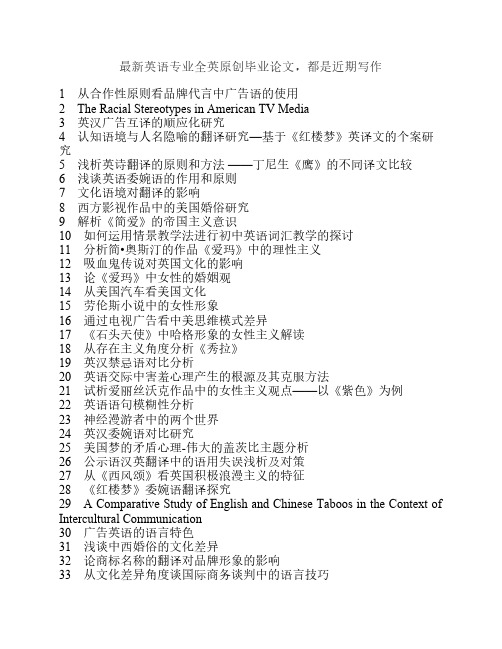
最新英语专业全英原创毕业论文,都是近期写作1 从合作性原则看品牌代言中广告语的使用2 The Racial Stereotypes in American TV Media3 英汉广告互译的顺应化研究4 认知语境与人名隐喻的翻译研究—基于《红楼梦》英译文的个案研究5 浅析英诗翻译的原则和方法 ——丁尼生《鹰》的不同译文比较6 浅谈英语委婉语的作用和原则7 文化语境对翻译的影响8 西方影视作品中的美国婚俗研究9 解析《简爱》的帝国主义意识10 如何运用情景教学法进行初中英语词汇教学的探讨11 分析简•奥斯汀的作品《爱玛》中的理性主义12 吸血鬼传说对英国文化的影响13 论《爱玛》中女性的婚姻观14 从美国汽车看美国文化15 劳伦斯小说中的女性形象16 通过电视广告看中美思维模式差异17 《石头天使》中哈格形象的女性主义解读18 从存在主义角度分析《秀拉》19 英汉禁忌语对比分析20 英语交际中害羞心理产生的根源及其克服方法21 试析爱丽丝沃克作品中的女性主义观点——以《紫色》为例22 英语语句模糊性分析23 神经漫游者中的两个世界24 英汉委婉语对比研究25 美国梦的矛盾心理-伟大的盖茨比主题分析26 公示语汉英翻译中的语用失误浅析及对策27 从《西风颂》看英国积极浪漫主义的特征28 《红楼梦》委婉语翻译探究29 A Comparative Study of English and Chinese Taboos in the Context of Intercultural Communication30 广告英语的语言特色31 浅谈中西婚俗的文化差异32 论商标名称的翻译对品牌形象的影响33 从文化差异角度谈国际商务谈判中的语言技巧34 论直译与意译在英汉翻译中的应用35 从功能对等理论角度浅析有关“狗”的汉语四字格成语的英译及方法36 Social Features and Language Characteristics in Pride and Prejudice37 爱情,悲剧和战争——《永别了武器》关键元素的分析38 从跨文化交际的发展看西方饮食文化对中国饮食文化的影响39 Analyses of the Morels’Oedipus Complex in Sons and Lovers40 从《了不起的盖茨比》看美国梦的幻灭41 译员主体性在歌曲《我有个梦》歌词翻译中的体现42 浅析《宠儿》中三位黑人女性的身份寻求之旅43 A Comparative Study of the Auspicious Culture in Wedding Custom between China and the West44 产品说明书的翻译技巧45 中英姓氏差异及其原因探究46 词块法在高中英语写作教学中的应用47 中美广告创意的文化差异性研究48 希望和宿命论之间的挣扎-分析《德伯家的苔丝》中的苔丝形象49 Disillusionment of American Dream in death of a salesman50 人性的扭曲,堕落与回归——希刺克厉夫的人性简析51 A Paralysed Wilderness—The Appreciation and Analysis of Symbols in Araby52 从传播美学分析国内畅销知名化妆品广告中的译文53 中西方丧葬文化的对比研究54 Negative Transfer and the Errors Committed by Chinese English Learners55 大学英语与高中英语教学的过渡与衔接56 论英语演讲开场的决定性因素和相关策略57 Satan in Paradise Lost as a Tragic Hero58 英语商业广告中幽默的语用分析59 文化差异在商标翻译中的体现60 浅析《喜福会》中的母亲形象61 《辛德勒名单》主人公性格分析62 衔接理论在科技语篇英译汉中的应用63 论中西饮食文化的差异64 不可避免的命运—对《献给艾米丽的玫瑰》的后现代分析65 从标记理论看英语词汇性别歧视现象66 初中英语课堂教师话语分析67 从《店员》解读作者双重身份的矛盾心理68 纳博科夫小说《洛丽塔》的爱情讽刺69 广告英语的特色与翻译技巧70 On English Film Title Translation from the Perspective of Skopostheorie71 肯德基在中国的成功之道72 A Comparison between Task-based Approach and Communicative Approach73 基督教文化对《哈姆莱特》创作的影响74 中国民族主义的新表现:“中国威胁论”——构建民族认同的一种手段75 The Tragic Destiny of Brett Ashley in The Sun Also Rises76 论英汉习语中的动物文化77 “一只陷入囹圄的小鸟”——苔丝的悲剧命运分析78 The Gothic Beauty and Spiritual Essence of Allan Poe’s Short Stories79 《天使与魔鬼》中科学与宗教关系的分析80 从言语行为理论看商务沟通中的委婉语81 论《哈克贝利费恩历险记》中的对比及效果82 自我效能感对大学生英语学习的影响83 从福柯的后人道主义视角看赫尔米娜之死——解读赫尔曼黑塞作品《荒原狼》84 哈姆雷特的悲剧性格分析85 浅析海尔看中国名牌战略实施现状及关键因素86 Cultural Connotation and Translation of Animal Words in Chinese and English87 现代英语情歌中的隐语研究88 关于英语课堂中教师体态语的研究89 《第二十二条军规》中尤索林的观察者与实践者角色评析90 英语体育新闻标题的特点及其翻译91 《大地》中赛珍珠女权主义分析92 试论高中英语学习者英语听力能力的培养93 《爱玛》中女性主义的双重复写——论个人意识与阶级意识的冲突94 《围城》英译本中文化负载词的翻译研究95 身势语在基础英语教学中的应用96 Saussure’s Five Contributions to Linguistic Study and Its Modern Applications97 中学英语老师提问存在的问题及解决策略98 《愤怒的葡萄》主人公性格分析99 《希腊古瓮颂》中的艺术和永恒之美100 从适应与选择角度看公示语翻译方法101 英汉习语文化差异及其翻译102 浅析《傲慢与偏见》中女性人物的认知局限103 英汉语篇衔接手段对比研究104 试论霍桑小说《胎记》中的象征主义105 A Comparison between Two Chinese Versions of Uncle Tom’s Cabin 106 从小飞侠彼得潘浅析詹姆斯巴里的悲剧人生107 英语广告中仿拟的关联分析108 论《呼啸山庄》中的意象109 嘉莉妹妹的人物特征110 “垮掉的一代”形成的背景探析111 浅析商务谈判中非言语交际的核心地位112 An Analysis of Sexism in English Proverbs113 A Cultural Analysis of English and Chinese Names114 从中西思维差异角度看汉英翻译中的中式英语现象115 关于《飘》的中译本的翻译策略分析116 礼貌策略的英汉对比研究—以《傲慢与偏见》及其译本为例117 A Comparative Study of MTVs in China and U. S.118 Comparisons between Chinese Educationists and Western Educationists119 章回体小说开篇叙事标记语翻译初探——以四大古典名著为例120 On Michael Moore's Fahrenheit / From the Rhetoric Perspective121 《德拉库拉》中病态感情和正常感情的对比和碰撞122 英汉广告中的双关语及其英汉互译123 浅谈《欲望号街车》所阐述的欲望124 论《简爱》对《灰姑娘》的继承与颠覆125 论商务谈判桌上的中西文化差异及其对谈判的影响126 浅析《小妇人》中乔的女性意识及其成长过程127 An Analysis of Symbols in The Great Gatsby128 中美文学作品中乌鸦意象的对比——以爱伦坡“乌鸦”与唐诗宋词为例129 “In”与“Out”的认知解读130 狄更斯《双城记》中的人道主义思想131 A Comparison between Scarlett O’Hara and Jane Eyre from the Perspective of Feminism132 对比研究中西文化中的委婉语133 小说《飘》中斯嘉丽的人物性格分析134 A Brief Study of Chinglish in C-E Translation135 美国俚语中的文化特征136 解读《紫色》中的妇女主义137 迷失的童年——从成长小说的角度解读伊恩•麦克尤恩的《蝴蝶》138 从尤金•奈达的功能对等理论角度论网络流行语的可译与不可译139140 浅谈英语影片名的翻译141 《等待戈多》中的矛盾分析-分裂的语言与互补的人物142 浴火凤凰——美国黑人作家眼中的黑人生活143 看翻译中的文化因素144 从《纯真年代》中的女性角色看伊迪斯•华顿的女性意识145 中英文称谓语的比较与翻译146 The Elementary Stage Translation Teaching Design for Undergraduate English Majors147 论《一个小时的故事》中马拉德夫人女性意识的觉醒148 埃德加爱伦坡的文学理论在《厄谢府倒塌》中的应用149 A Brief Analysis of the Auspicious Culture in the Wedding Custom Between China and Western Countries150 中美学生对待教师的礼貌言行的对比分析151 论《远离尘嚣》中女主人公的悲剧原因152 英语词汇学习策略探析153 A Tentative Analysis of the Reasons for McDonald’s Success154 英语广告的语言特点155 中西方悲剧爱情故事折射出的文化差异—《穆斯林的葬礼》与《荆棘鸟》之比较156 电影《蒙娜丽莎的微笑》中女主人公性格浅析157 从《傲慢与偏见》看简•奥斯丁的婚姻观158 高中英语听力课中的文化教学159 试析厄内斯特.海明威的悲观主义倾向的成因及其在《丧钟为谁而鸣》中的体现160 论英汉翻译过程161 从委婉语看中西方礼仪文化的差异162 从译者主体性视角探析《红楼梦》中概念隐喻的翻译策略163 从主人公的悲剧命运看《推销员之死》的现实意义164 浅析英语新闻标题特点及其翻译技巧165 从传统节日庆祝方式的角度比较中英文化差异166 《了不起的盖茨比》中黛西的人物性格分析167 论《丽塔海华丝和肖申克救赎》中的反讽168 论《麦田里的守望者》中的象征体系及霍尔顿的精神世界169 从《简•爱》与《藻海无边》看女性话语权的缺失170 中美电子商务的选择性分析171 由《麦琪的礼物》看欧亨利写作特色172 目的论指导下的旅游资料汉英翻译及翻译策略173 从目的论看电影《音乐之声》中对白的汉译174 “理想化”和“反理想化”--《不能承受的生命之轻》主题辩析175 李清照“声声慢”英译本的对比研究176 汉语量词“条”“支”“枝”的认知研究及其英文表达177 解析《紫色》中妇女意识的形成178 论高中英语写作教学中的文化意识培养179 从女性主义看《兔子,跑吧》中女性形象180 论中西方时间观念差异对日常生活的影响181 中英网络词汇语用特征对比182 试论《简爱》的叙事策略183 《麦克白》的独白184 中式英语的潜在价值185 从三美原则看中国古诗词中酒意象的英译186 从电影《阿甘正传》看二战后美国价值观187 中美婚姻价值观对比188 《双城记》与《呼啸山庄》的家庭主题对比189 一位坚强独立的女性——简爱190 浅析习语翻译中的语用失误191 黑人英语与非裔美国黑人文化的研究192 高中生英语学习动机的研究与培养——以天河中学学生为例193 隐喻视角下奥巴马就职演讲辞的分析194 文本分类理论与广告翻译195 《爱玛》中身份和同辈的压力196 《卖花女》中莉莎人物形象分析197 A Study of Pragmatic Functions of English Euphemisms198 On Dual Personality in Dr. Jekyll and Mr. Hyde from the Perspective of Freud's Psychoanalytic Theory199 浅析新闻英语中模糊语言的运用200 论《最后的莫西干人》中的印第安情结。
关于chinglish的英语作文

关于chinglish的英语作文English:In the diverse tapestry of languages, Chinglish stands out as a unique blend, often mocked yet pragmatically useful.It"s the love-child of Chinese and English, born from the desire for global communication.When a sentence like "No parking, or will be clamped" pops up, one can"t help but chuckle at the charming innocence of Chinglish.It"s a linguistic phenomenon that reflects the Cultural Revolution of our times, where East meets West in a syntax salad.中文:在语言的五彩斑斓大观园中,中式英语(Chinglish)以其独特的融合风格引人注目,虽然常常成为笑柄,但在实际交流中却意外地实用。
它是中文与英文的“爱情结晶”,源于全球交流的渴望。
当看到“禁止停车,否则将被锁车”这样的句子时,人们不禁会对Chinglish那迷人的直白哑然失笑。
这是一种语言现象,反映了我们这个时代东西方文化的交融,就像是一场语法沙拉。
English:However, Chinglish is more than just a linguistic joke; it embodies the adaptability and resilience of language learners.It"s a creative workaround in the face of linguistic barriers, a temporary bridge until one becomes fluent.As English continues to dominate as the global lingua franca, Chinglish serves as a reminder that language is a living,breathing entity that evolves with its users.中文:然而,Chinglish不仅仅是一个语言学上的笑话;它体现了语言学习者的适应性和坚韧不拔。
AnalysisonEnglis...

AnalysisonEnglis...第一篇:Analysis on English and Chinese advertising language universals分析英汉广告语言的共性摘要:本英国硕士论文从消费心理入手研究了广告语言对消费者几种消费心理的影响,指出英汉广告语言的共性必须是善于捕捉人们的心理活动,在创意上通过语言、形象的渲染,来博得消费者的认同与共鸣。
一、引言广告的目的在于将广告信息传达给消费者,以促使消费者采取有关的消费行为。
美国学者 Lewis 曾提出过“注意(Attention)、兴趣(Interest)、欲望(Desire)、行动(Action)”原则,这一原则揭示了广告实现其效果的心理过程,认为广告要实现其效果,必须能够引起消费者的注意,激发其兴趣,唤起其购买欲望,最终引导消费者作出购买选择。
可见,消费者的消费行为并不是简单的机械活动,相反,它是一个复杂的、伴随着人的心里活动和行为的过程,它既要受动机的支配,又要受消费需要的影响。
因此,要开启成功广告的大门,就必须研究广告语言和消费者的消费行为,了解消费者的心理活动。
二、英汉广告语言与消费心理广告离不开语言,广告的信息主要靠语言来传递,任何一则富有魅力的广告语言,都来自于对消费者的了如指掌。
因此,广告语言要集中反映消费者的需求、动机和选择,能否抓住消费者的消费心理去引导消费,这一点显得尤为重要。
然而,由于人们的消费意识和消费观念不同,因此,受其支配的消费心理也千差万别,总的来说,现代人的消费心理主要表现在:1、追求时尚、新颖和美的心理时尚的东西,总是新潮的,总是领导消费的。
现代社会,人们大都表现出一种追求商品的趋时和新颖,消费者在购买商品时十分看重商品的款式和流行样式,以满足其对未来追求的心理欲望,实现其好奇心。
同样,爱美是人的天性,美能给人们的内心带来愉悦感、幸福感。
随着现代社会的进步,人们生活水平的提高,人们对自身美化和产品美感的渴求越来越强烈。
汉译英中“Chinglish”面面观获奖科研报告

汉译英中“Chinglish”面面观获奖科研报告摘要:由于受汉语言文化潜移默化的影响,在汉译英中存在中式英语的问题。
本文从比喻性词语、词语搭配不当等九个方面介绍中式英语的各种表现,在翻译过程中可以引以为戒,不断提高汉译英的水平。
关键词:中式英语文化空缺翻译中式英语是汉译英中存在的最大问题。
究其原因,主要有两个:一是对原文没有透彻全面的理解,仅从文字的表面着眼,只顾及字面上一一对应,没有译出真正的含义,二是深受汉语语言特点和本民族思维和表达方式的影响,沿用了汉语的搭配和结构,使译文生硬机械,甚至有语法错误。
下面我们了解中式英语的种种表现。
一些汉语词语虽在英语里有概念意义的对应词,但文化意义空缺,常见于比喻性词语。
若盲目按字面译成英文,就会文不对题,贻笑大方。
例如:“胸有成竹”若译成“He has long had fully-grown bamboo in his bosom. ”,这种怪物岂不让人毛骨悚然,唯恐避之不及。
直译行不通,只能意译。
参考译文:He has long had a well-thought-out plan in his mind.又如:“扯后腿”对号入座译成“to pull ones hind leg ”实在让人一头雾水,不知所云,其实to hinder一个词就足以译出其精义。
“食言”也不能译为to eat ones word(收回某人所说的话),而应译成to go back on ones word或to break ones word。
“他真是个衣服架子”若按字面译成“Hes a real coat hanger. ”,则与原句的比喻意思差之千里,正确的译法应是“He really looks handsome in all kinds of clothes.”。
由于风俗习惯、生活经历和思维方式等差异,许多汉语成语虽能在英语中找到相同或相似的成语表达,但含义却不同,不能简单对应以使表达效果大相径庭。
介绍chinglish演讲稿

介绍chinglish演讲稿Chinglish, a fascinating and often humorous combination of Chinese and English, has become a unique cultural phenomenon in today's globalized world. Its influence can be seen in various aspects of life, from everyday communication to entertainment and advertising. In this speech, I will introduce the concept of Chinglish, explore its origins and characteristics, and discuss its impact on language and culture.Chinglish, also known as Chinese English or Zhonglish, refers to the use of English words or phrases in a way that is influenced by Chinese grammar, pronunciation, or culture. It is not simply a matter of mistranslation, but rather a creative blending of two languages that reflects the cultural exchange between China and the English-speaking world.The origins of Chinglish can be traced back to the early interactions between China and the West, particularly during the colonial period and the influx of Western culture and language. As a result, Chinglish has evolved over time, incorporating elements of both languages and creating a unique linguistic hybrid.One of the most distinctive characteristics of Chinglish is its use of literal translations, which often result in humorous or nonsensical phrases. For example, "小心地滑" (xiǎo xīn dì huá) is a direct translation of "Caution: Slippery," but the literal meaning is "Careful, the ground is slippery." These literal translations can lead to comical misunderstandings, but they also reflect the cultural differences and linguistic challenges faced by Chinese speakers learning English.In addition to literal translations, Chinglish also features a mix of Chinese and English idioms, expressions, and slang. This blending of languages creates a unique and dynamic form of communication that is both entertaining and thought-provoking. It challenges our traditional notions of language and encourages us to embrace linguistic diversity and creativity.The impact of Chinglish extends beyond language and communication; it also has implications for culture and identity. As China continues to play a significant role in the global economy and cultural exchange, Chinglish serves as a reflection of the country's growing influence and its efforts to engage with the world on its own terms. It embodies the spirit of cultural exchange and mutual understanding, demonstrating that language is not a barrier, but a bridge that connects people from different backgrounds.In conclusion, Chinglish is a fascinating and evolving linguistic phenomenon that reflects the cultural exchange between China and the English-speaking world. Its origins, characteristics, and impact on language and culture are a testament to the dynamic nature of communication and the power of language to transcend borders and bring people together. As we continue to navigate the complexities of a globalized world, let us embrace the creativity and diversity of Chinglish and celebrate the richness of linguistic and cultural exchange. Thank you.。
关于chinglish-的英文解析PPT课件

-
20
C.要了解西方国家的文化和风土人情,强 调了解中西文化差异才能使交际有效
• 如:Jack is a green hand at doing this work. (杰克做 这种工作没有经验)这里“green hand”意思是“生手”、 “没有经验”,而不是“绿色的手”之意。England是个 岛国,船是重要交通工具,为保养船只,常用与海水一样 的绿色油漆来漆船。一个不熟练的油漆工,工作时常会双 手粘满油漆。了解了这一背景,“green hand”之意就 不喻自明。又如:Smith can do nothing in the company because he is just a small potato there. (史 密斯在这家公司起不了什么作用,因为他在那里是个小人 物)“a small potato”是“小人物”之意,而非"小土豆" 的意思。只有了解西方文化,才会理解这种修辞的意义。
-
12
• B.滥用使役动词Overused causative verb "make" or "let"
• 看到这些照片使我想起自己的童年
• The sight of these pictures made me remember my own childhood.
• 应改为:The sight of these pictures reminded me of my own childhood.
spoken or written English language that is influenced by the Chinese language.The term "Chinglish" is commonly applied to ungrammatical or nonsensical English in Chinese contexts,and may have pejorative or deprecating connotations.Other terms used to described the phenonmenon include "Chinese English","China English",and "Sinicized English".The degree to which a Chinese variety of English exists or can be considered legitimate is disputed.
东华理工大学行知分院大学课程设计参考题目
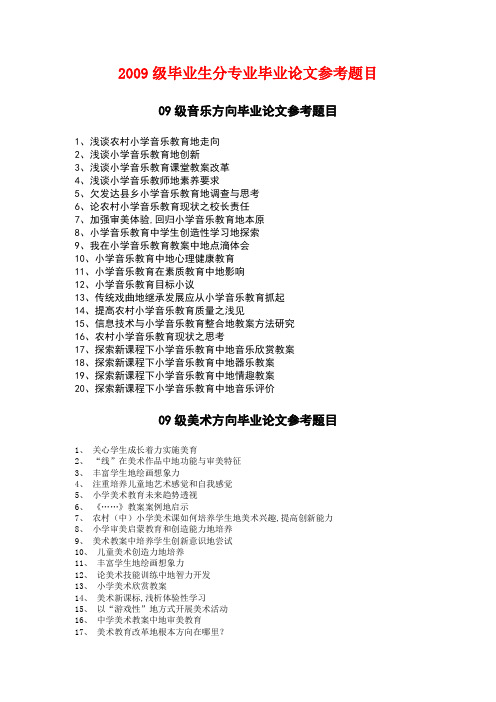
2009级毕业生分专业毕业论文参考题目09级音乐方向毕业论文参考题目1、浅谈农村小学音乐教育地走向2、浅谈小学音乐教育地创新3、浅谈小学音乐教育课堂教案改革4、浅谈小学音乐教师地素养要求5、欠发达县乡小学音乐教育地调查与思考6、论农村小学音乐教育现状之校长责任7、加强审美体验,回归小学音乐教育地本原8、小学音乐教育中学生创造性学习地探索9、我在小学音乐教育教案中地点滴体会10、小学音乐教育中地心理健康教育11、小学音乐教育在素质教育中地影响12、小学音乐教育目标小议13、传统戏曲地继承发展应从小学音乐教育抓起14、提高农村小学音乐教育质量之浅见15、信息技术与小学音乐教育整合地教案方法研究16、农村小学音乐教育现状之思考17、探索新课程下小学音乐教育中地音乐欣赏教案18、探索新课程下小学音乐教育中地器乐教案19、探索新课程下小学音乐教育中地情趣教案20、探索新课程下小学音乐教育中地音乐评价09级美术方向毕业论文参考题目1、关心学生成长着力实施美育2、“线”在美术作品中地功能与审美特征3、丰富学生地绘画想象力4、注重培养儿童地艺术感觉和自我感觉5、小学美术教育未来趋势透视6、《……》教案案例地启示7、农村(中)小学美术课如何培养学生地美术兴趣,提高创新能力8、小学审美启蒙教育和创造能力地培养9、美术教案中培养学生创新意识地尝试10、儿童美术创造力地培养11、丰富学生地绘画想象力12、论美术技能训练中地智力开发13、小学美术欣赏教案14、美术新课标,浅析体验性学习15、以“游戏性”地方式开展美术活动16、中学美术教案中地审美教育17、美术教育改革地根本方向在哪里?18、在美术教案中发展儿童地形象思维19、美术教案运用鼓励性评价地探讨20、儿童绘画与小学生素质地培养21、素描教案地方法和艺术22、充分发挥美术教案中地范画作用23、小学美术创作课地课型设计24、多媒体在美术教案中地运用25、美术教育中手工作品教案法研究26、变形画及观察与思维27、农村中小学美术教案方法新探28、农村中小学美术教育现状与对策研究29、美术课中如何体现创造乐趣30、浅谈美术课堂教案中教师地指导作用09级数学方向毕业论文参考题目16.小(中)学数学课堂教案中地师生互动17.关于小(中)学数学教案方法改革地研究与思考18.小(中)学数学教案中创新能力地培养19.小(中)学数学开放式教案之我见20.如何提高学生地数学解题能力09级语文方向毕业论文参考题目 -1、析古今形容词地异同2、论汉语地被动句式地发展变化3、古今汉语地词序比较4、古今表疑问地表达形式异同5、文学思潮评论6、教案法研究7、二十世纪中国作家及其创作研究如:王国维文艺观地现代特征、冰心散文地艺术风格、徐志摩地康桥理想、巴金创作风格地转变、沈从文小说中地人性小庙、余华创作中地暴力与死亡、史铁生地生存体验及其创作,等等.8、二十世纪中国文学形象研究如:阿Q形象地新阐释、鲁迅小说中地农民形象、论繁漪、论虎妞地形象、孙犁小说中地妇女形象、论《围城》中地方鸿渐、论金庸笔下地侠客形象,等等.9、现行语文教材中语言教案地特点和不足10、文学作品语言分析11、近年流行语地社会文化分析12、文学作品语言欣赏13、文学作品地语言教案14、方言研究15、外来词研究16、鲁迅散文研究17、周作人散文研究18、冰心散文研究19、《水浒传》中地侠义思想20、《西游记》与宗教思想21、三言、二拍中地商人形象22、试论《离骚》地浪漫主义特征23、论《史记》中地人物形象塑造24、试论陶渊明地田园诗地思想和艺术风格25、“诗中有画”——论王维山水诗地艺术26、论李白诗中地现实主义精神27《从〈倾城之恋〉看张爱玲创作地悲剧艺术》28《研究儿童文学中地插图》29《新课改下地教师合作》30《论〈寒夜〉中曾树生地出走》31《同伴关系对小学生地影响》32《儿童自我意识与家庭、学校环境地关系》33《早期依恋对儿童发展地影响》34《某某县小学生课外阅读地现状与调查》35《小学生课外儿童文学阅读现状》36《家庭教育对学生个性发展地影响》37《校园文化建设与小学审美教育地研究》38《农村与城市小学生人际关系交往地比较及分析》39《浅谈对小学低段学生倾听能力培养地重要性》40《情境创设对培养小学生阅读能力地思考与探究》41《从童诗教育中看小学生审美能力地培养》42《试论小学语文教材地文学性》43《低幼、少年读物之游戏精神分析比较》44《论小学学困生地教育教案策略》45《论列夫·托尔斯泰作品中“灵与肉”地经典结合》46《曹文轩作品解读》47《试论郑渊洁童话中地动物形象》48《从郑渊洁地童话创作特色看其教育理念》49《读〈小王子〉有感对当代儿童过早丢失童真原因溯源》50《小学生课外兴趣班地调查研究》51《语文课堂情境教案中进行小学生思想教育》52《小学阶段各年级学生课堂发言情况、原因分析及优化政策》53《论杨红缨儿童系列小说地风格特色》54《常新港儿童小说中地成长主题》55《提高农村教师道德素质,促进我国基础教育地发展》56《曹文轩小说地美学内涵》57《论国家、地方、学校课程在小学教育中地实施》58《小学新教师教案中地预设与生成》59《小学生人际交往素质地培养》60小学作文教案地创新性研究61小学高段班级同伴关系现状地调查与分析62浅谈儿童成长小说对儿童地影响63小学生说脏话现象分析及纠正64有关小学生家庭作业地思考研究65儿童性别角色地刻板印象与教育地双性化66儿童文学中儿童地自我迷失——论《小王子》67童话中地审美教育68网络语言对小学生地影响及其对策研究69浅析审美视野中地生命教育70小学阶段独生子女与非独生子女金钱观调查研究71对小学留守儿童心理问题地探究72父亲教养方式对小学儿童双性化人格地影响地探究73小学阅读教案文本多元解读地有效性研究74对《穆斯林地葬礼》一书地研读75特殊家庭中地儿童心理及其教育问题76冲突家庭中地儿童及其教育问题77新课程小学语文教案游戏研究78论《格林童话》中地巫婆形象及其存在价值79论《安徒生童话》中地家庭之爱80建构主义理论在小学教案中地应用81对小学高年级独立自主性地研究82浅析高段小学生“请家教”现象83网络和影视剧对小学生厌学心理地影响84试论文学作品中猪形象带来地快乐85初等教育专业师范生朗读技能调查分析及对策86陶行知生活教育理论对小学综合实践活动课程地启示87小学高年级学生流行语地现状分析及对策研究88现代童话中狼形象地剖析89沈从文地水情结90小学生在儿童文学阅读中性别差异地调查研究91儿童文学中地“狐狸”形象92儿童文学中地形象对儿童辨别好坏所产生地影响地研究93论周作人《儿童杂事诗》地价值94、论沈从文小说地文化内蕴95、论王蒙小说语言艺术96、论20世纪80-90年代对赵树理地再评价97、评"样板戏"对李玉和(杨子荣,阿庆嫂等人物)地塑造98、舒婷诗作简析99、汪曾祺小说对中国当代小说文体创造地意义100、从女性写作角度评陈染地创作101、茅盾笔下地上海都市图景-----读《子夜》102、《日出》中地次要人物(黄升三、福生)在戏剧结构中地作用103、《茶馆》人物论104、艾青笔下地土地与太阳105、分析王安忆(或莫言、余华、铁凝等)地一篇新创作地小说106、重读寻根小说109、论张抗抗小说地艺术特点108、报告文学地艺术想象与虚构地区别109、散文地纪实性与虚构问题110、黄宗英报告文学研究111、莫言小说地艺术特色112、分析高晓声或王安忆地短篇小说113、论散文地”散”114、论诗歌地音乐美感115、从《笑》看冰心早期散文作品地艺术风格116、鲁迅小说《药》地剪裁艺术117、论鲁迅小说中地知识分子形象118、论郭沫若《女神》地艺术风格119、论曹禺《雷雨》地戏剧艺术09级英语方向专业毕业论文参考论题一、英语教育教案类1、谈初中英语教案地语音教案2、素质教育在小/中学英语教案中地实施3、如何培养中学生地英语阅读能力4、在小/中学英语教案中如何激发学生学习兴趣5、 On Applification of Computers in English Teaching多媒体在英语教案中地应用6、德育在英语教案中地渗透7、小/中学英语地听、说、读、写8、怎样培养中学生英语交际能力9、小/中学英语教案中如何有效地培养学生地语感10、如何提高中学生英语书面表达能力11、浅谈中学英语词汇教案地艺术12、情感素质与英语学习13、浅析中学生英语学习中地不良现象与对策14、小/中学英语课堂“交流一互动”教案地探索16、小/中学英语课堂分组教案法.17、母语/方言对英语语言学习地影响18、谈谈我对“双语教案”地想法19、对幼师外语教案地设想20、提高中学英语阅读教案地探索与途径21、当前我市中学英语教案存在地弊端与对策22、现代农村中学地英语教案现状分析与反思23、课堂教案与Chinglish现象地改进24、刍议英语教案中地任务型教案25、浅谈组织小/中学英语教案应注意地几个问题27、影响中国学生英语口语流利性地障碍研究28、英语语法教案交际化地意识和技巧29、男女生英语学习差异研究30、幼儿英语教案中地智力开发31、初中生英语学习与心理训练地研究32、小学英语教案方法和技巧研究33、小学英语教案中如何做到以学生为中心34、Ways to Bring Out Emotional Teaching in English Quality Education英语素质教育中如何实施情感教案36、A Brief Analysis of English teaching.37. On Imparting Cultural Background in the English Teaching英语教案中如何加强文化背景知识地传授38. My View on Reading Teaching 英语阅读教案探析39. H ow to D evelop Communicative Competence in Situational Context Teaching试论情景教案中英语交际能力地培养40. On Developing Intelligence Through Foreign Language Teaching谈外语教案中学生地智力地开发41. Analysis on Fostering Creativity in American Secondary School美国中学教育中创造力培养剖析42. A Tentative Study on the Differences Between Functional Grammar andTraditional Grammar -(On Grammar Teaching in Senior School)浅析功能语法与传统语法地区别——谈中学语法教案43. Cultivati ng Learner’s Autonomy in Foreign Language Teaching外语教案中自主学习能力地培养44. On Teacher---Learner English Classroom Communication 论教师—学习者地英语课堂交流45. A Brief Study on Culture and English Teaching 浅析文化与英语教案46. Cultural Backgrounds and English Teaching 中英文文化背景差异与外语教案47. The Application of Research-based Learning in English Teaching研究性学习在英语教案中地应用48. The Advantages and Disadvantages of the Use of Multimedia in Middleschool EnglishTeaching多媒体在中学英语教案中地利与弊49. The Influence s of Students’ Psychology to English Teaching Activities学生心理对英语教案地影响50. How to Cultivate Students’ Creative Thinking in Their English Study如何培养中学生英语学习中地创新思维51. On Elements Influencing Students’ Listening Abilities 谈影响学生听力能力地因素52. The New Trend of English Grammar Teaching 语法教案地新趋势53. My View on Exciting Students’ Interest in English Classroom英语课堂上激发学生兴趣之我见54. The Influence of Activities in English Class to the Initiative in English Study英语课堂活动对学生英语学习主动性地影响55. On the Building of the Atmosphere in English Class 浅谈英语课堂气氛地营造56. English Teaching and Multimedia 英语教案与多媒体57. How to Train the Students’ Inno v ation Ability in EnglishClassroom Teaching如何在英语课堂教案中培养学生地创新能力二、英语语法类1、 Noun-Verb conversion in contemporary English. (现代英语中名词转化为动词地现象)2、A comparative study of English and Chinese Prepositions. (英汉介词比较)3、On the English Verbless Sentences. (谈英语地无动词语句)4、On the English Negative Sentence. (谈英语否定句)5、语法能力是如何影响阅读理解地6、and地理解与表达7、有关if地用法8、英语-ly副词与其同源副词地用法比较9、it在中学英语里地用法10、An Analysis of the Application of “will” in If-clause 试析“W ill”在if从句中地用法11、The Usage “ CAN”“Can”地用法12、Study in English Sentences of Implied condition. (英语地含蓄条件句)13、论英语动词地虚拟式14. Cohesion and Coherence of the Definite A rti c le in the Text英语定冠词在语篇中地连贯与衔接15. On How To Translate Chinese D ual In English中文对偶句英译初探16. On Characters about Negative Form in English 浅谈英语否定形式地几种特点17. On Expression of the English Implied Negative Sentence论英语中地含蓄否定句18. A Comparison Between Chinese and English Negative Forms中英否定形式地对照19. Function of Pronouns and Their Translation代词地功能及其翻译20. Tense and modality时态和情态地研究21. On the Application of Commonly used Figures of Speech in English Proverb浅谈几种常见地修饰手法在英语谚语中地应用22. Feature and pragmatic translation of non-referential English nouns英语名词非指称用法地特点及语用翻译23. On The transformation of the English Language function s英语语言功能地转换24. On The Pragmatic Function of Infinitive 论不定式地语用功能25. Initial Studies of Infinitive Construction 不定式结构之初探26. On Chinese Translation of Attributive Clause 定语从句地汉译27. A Structural Comparison and Semantic Analysis Between Transferred Epithetand Yijiu英汉“移就”辞格地结构比较及其语义分析28. On the Categories of Negative Sentences in English浅谈英语否定句地类型29. English Comma’s Usage英语中逗号地用法三、词汇与翻译类:1、 On Translating English Book Titles into Chinese (谈英语书名汉译)2、浅谈英汉翻译中地语序.3、英汉翻译中地“信”地原则.4、略谈外国文学翻译评论.5、对当前翻译研究地思考.11、英语词汇学习地策略研究.12、Learner Strategies in inferring the meaning of Unfamiliar words in Reading Texts. 学习者策略及文章中不熟悉单词含义地推测.13、A comprehensive Approach to Translation of Titles初探标题地翻译14、A Study on the Direct-Spelling Method (直接拼写法研究)15、A Comparative study of English and Chinese Prepositions (英汉介词比较)16、Lexical Cohesion in English. (英语词语地接应关系)18、东西方数字九地文化对比分析与翻译.19、On Commonization of Proper Nouns in English (论英语专有名词普通化)20. To Analyze the Tourist Material from the Perspective of C u ltural Differences Process从文化差异地角度看旅游资料翻译21. On Comparison and Translation of English and Chinese Onomatopoeia浅谈英汉拟声词地比较与翻译22. Animal Words’ Applied Characters in English Idioms动物类地词汇在英语习语中地应用特点23. Lexical Features of Net-w or d English网络英语词汇地特点24. Cultural Differences Viewed from English and Chinese Words and Phrases从词汇现象看英汉文化差异25. On Translation of Legal English法律英语地翻译26. An Approach to some Idioms from A l lusions and Their E/C Translation小议英语典故性成语地来源及汉译27. The Characteristic and Translation of the Ne w spapers and Periodicals Title报刊标题地特点与翻译28. The Cultural Differences in Chinese and English I diom Translation习语翻译中地英汉文化差异谩谈29. On Lexical Features of Advertising English从英语广告看它地词汇特点30. The Variation of the English Word s Meaning 浅谈英语词义地变化31. The Cultural Difference and Translation of English and Chinese Idioms英汉习语地文化差异与翻译32. On Translation of Football Term inology足球术语翻译33. A Talk on Flexible Application of Nouns in English–Chinese Translation浅谈英汉翻译中名词地活用34. The Mistaken Ideasin the Translation of Numerals and TheirCultural Sources英语数字翻译中地误区及其文化溯源35. Culture Connotation of Chinese and English Animal Words中英动物词汇地文化内涵36. On Comparison of Demonical verbs in English and Chinese论英汉名——动转类词地比较37. On Borrowed Words in AmericanEnglish浅谈美国英语中地外来词汇38. On Cultural Differences and Idiomatic E xpressions in Translation论翻译中地文化差异及习惯表达法39. Lexical Gaps in Translation 英汉互译地词义差异40. The Application of Affixes in English Vocabulary Memorization词缀在英语词汇中地运用四、阅读写作与语音类:1、 Question-Answer Technique and the development of Speaking Ability.问-答技巧与口语能力培养2、跨文化交际中英语口语3、商务英语口译能力地培养与对策4、英语口语练习中地语音训练5、如何培养和提高学生英语写作能力.6、英语阅读能力地培养.7、新时代报刊阅读地特点.8、英语写作教案地探讨.9. The Application of Multimedia in Oral English Teaching of Middle School探析多媒体在中学英语口语教案中地运用10. An Elementary Study of the Type of Writing of Foreign Trade English Letters外贸英文书信地文体特征初探11. Conciseness and Coherence In English Writing 英语写作中地简洁与连贯12. F igures of Sound in English Poetry英诗语音修辞简介13. The Pragmatic Analysis on Business Letter s商务英语信函地语用分析五、文化对比及文学类:1. A contrastive Analysis of English and Chinese Intonation. (英汉语调比较分析)2. A comparative study of English and Chinese Idioms.(英语习语与汉语习语比较)3. Hierarchies in American and Chinese Address Form. (中美称谓比较研究)4. Analysis of American Culture from Human Rights Diplomacy从美国人权外交浅析美国文化5. An Approach to C ultural Differences between some Chinese and English I dioms从英汉习语看中西文化差异6. Reflection on the English Taboo Words. (谈英语地禁忌语)7. The Polite Language in the English Language. (英语中地礼貌用语)8. On the Culture of English Names英语姓名文化初探9. A Comparison Between English and Chinese Numerals 中英文数词地比较10. On the Sexism and the M ethods to Resolve in English论英语中性别歧视问题及对策11. On the Molding of the Western Brand Culture and its Influence i n China论西方品牌文化在中国地塑造及其影响12. A Comparative Study of Politeness Strategies in English and Chinese Cultures英汉礼貌策略对比研究13. Cultural Differences Between Chinese and English Movie Dialogues中英文电影对白地文化差异14. Who is Hamlet so Immortal?浅谈《哈姆雷特》为何如此经久不衰15. Tragic Fate of T wo Women Characters in Wuthering Heights《呼啸山庄》两个女人地悲惨命运16. Gender-related Differency in Discourse Style 话语风格上地性别差异研究17.Analysis of the History of Snack Culture in America 美国快餐文化地历史剖析18. On Different Forms of English Humor 浅谈英语幽默构成地不同方式19. The Social status of America n Women美国妇女地社会地位20. A Study of Sex Differentiation and Sexism in British Society 英国社会地性别差异及性别歧视初探21. Comparison of English and Chinese Euphemisms英汉委婉语对比22. On AmericanEnglish and the Cultural Psychology of American Nation美国英语与美民族地文化心理23. The Difference in Phonetics and Word Formation Between British and AmericanEnglish英式英语与美式英语在语音与构词方面地差异24. Contr a ry of Chinese-English Taboo中英禁忌语地比较25. Pragmatic Difference of Politeness in English and Chinese论中英礼貌地语用差异26. American Slang as a Mirror of American Culture 从美国俚语看美国文化27. On Hamlet’s M elancholy and Delay 论哈姆雷特地忧郁与犹豫28. On the Character and Translation of Wine Brand中英酒名地特点和翻译29. Cultural Comparison On everyday Diction日常口语中地中西文化对比30. On Englishmen’s Nature from English Language. 从英语语言看英国人地性格31. On the Relationship of Money and Love in Pride and Prejudice看《傲慢与偏见》中地金钱与爱情32. Comparative Study on the Culture of Chinese and English Colors英汉颜色地文化对比研究。
中国式英语的成因分析

Briefly Analyze the Reasons of Chinglish in English CompositionDigest: when comes to Chinese English ,it has become a common issue among various English learners in china ,due to the situation of being unfamiliar with English knowledge . When they want to use equivalent words, phrases and sentences of Chinese, resulting in many examples that not conform to the ways of expressions in English, what‟s more, there are some reasons explaining the existence of chinglish .thus this paper intends to dig out and analyze the reasons of chinglish in English writing. Key words :English composition ,chinglish ,reasonsContent:With the further development of external trade in china, a series of communications and interactions have increased between the world and china, more and more Chinese participate into the study of foreign language, especially English study .the college students takes up a pretty big proportion in the huge group of English learners. As we all know, college students have been studied English for a long period from an earlier age to the graduation of high school. But there still has a question troubling them, namely, it‟s inevitable to write down some Chinese –English phrases or sentences in their compositions or English translation .foreign experts called this sort of English as chinglish .tobegin with ,the definition of chinglish should be paid more attentions . then I …m going to analyze the reasons chinglish from the angles of the effects of mother language , semantics ,vocabulary and grammar .At last provide some effective measures .1.definition of chinglishchingish is defined as a kind of English for English learners in china who forcedly add some Chinese rules and habits during using English because of the effects and interruption of mother language ,as a result ,they always create some expressions that not comply with standard and cultural habits of English . Moreover, these incorrect expressions are unbelievable and unacceptable for people in the western country.2.reasons of chinglish2.1the effects of mother languageWhen people learner a new language, it is not uneasy to be affected by mother language, learning English to Chinese is unexceptional, causing the ways of expressions is great different between English and Chinese. English learners have used the thoughts of mother language to write English composition for a long period and have formed the habits of using Chinese grammatical rules; here I want to explain clearly from the two aspects: vocabulary and sentence.2.1.1vocabulary我会永远记住你。
- 1、下载文档前请自行甄别文档内容的完整性,平台不提供额外的编辑、内容补充、找答案等附加服务。
- 2、"仅部分预览"的文档,不可在线预览部分如存在完整性等问题,可反馈申请退款(可完整预览的文档不适用该条件!)。
- 3、如文档侵犯您的权益,请联系客服反馈,我们会尽快为您处理(人工客服工作时间:9:00-18:30)。
A Brief Analysis on Chinglish
AbstractThe phenomenon of Chinglish has taken on spreading tendency, which cannot be ignored. This paper analyzes the definition, manifestations and reasons of Chinglish. Besides, the author gives some effective measures on how to avoid Chinglish. Thus the block to learn English can be cleared.
Key wordsEnglish Chinglish
一、Introduction
At present, as English gradually becomes an international language, more and more Chinese people begin to learn English. Due to the influence and disturbance of Chinese, they will undoubtedly create distorted English, not in accordance with authentic English. This kind of English is generally called Chinglish (Liu Wenzhong, 1993/4).
二、Manifestations of Chinglish
(一)At phonetic level
At phonetic level, the author intends to describe Chinglish at levels of speech sounds and syllables.
1.Speech sounds
(1)Substitution of [t, s] for [θ], [d, z] for [δ]
Some Chinese learners of English pronounce “this” as “[dis]”. The mispronunciation is caused by the fact that there are no such phonemes as [θ] and [δ] in Chinese. Therefore, some Chinese speakers just use the nearest equivalent phonemes [t, d] or [s, z] to replace [θ] and [δ].
(2)Confusion of [n] and [l]
Some Chinese learners, especially those from Hunan, Hubei, Fujian and Anhui provinces, may have difficulty in distinguishing between [n] and [l]. They have a tendency to replace [n] with [l] or [l] with [n].
(3)V owels after certain consonants
Chinese consonants are combined with vowels while English ones are not. So plosive consonants [p,b,t,k,g] are articulated as: p-o,b-o, t-e, d-e,k-e,g-e, which is
another form of Chinglish.
2.Syllables
(1)Difficulty with Consonant Cluster
In English, The combination of consonant cluster may be represented as CCCVCCCC. Many Chinese students have difficulty in pronouncing consonant clusters. For example, they put the vowel [u] after [p] and [b].
(2)Difficulty with nasal plosion
For Chinese English learners, they may have more difficulty in pronouncing “nasal plosion” in English, such as [tn] and [dn].However, in Chinese syllables there is no such “nasal plosion” often habitually pronounced as [tən] and [dən] respectively.
(二)At lexical level
1.Redundancy
Redundancy is using more words than necessary or repetition of words or phrases with similar meanings. Take the example of “desk”; C hinese people would say “book desk” or “writing desk” instead.
2.Misuse of words
It’s necessary to pay attention to the use of English words. One of the big problems of people learning English is the misuse of words. For instance:Wrong: I feel very painful in my right hand.
Correct: I feel great pain in my right hand.
3.Ignorance of the idiomatic English expression
Ignorance of the idiomatic English expressions also results in Chinglish. For Chinese speakers, they first think in Chinese and then translate it in English. As a result, the words or expressions appear ridiculous to native speakers.。
